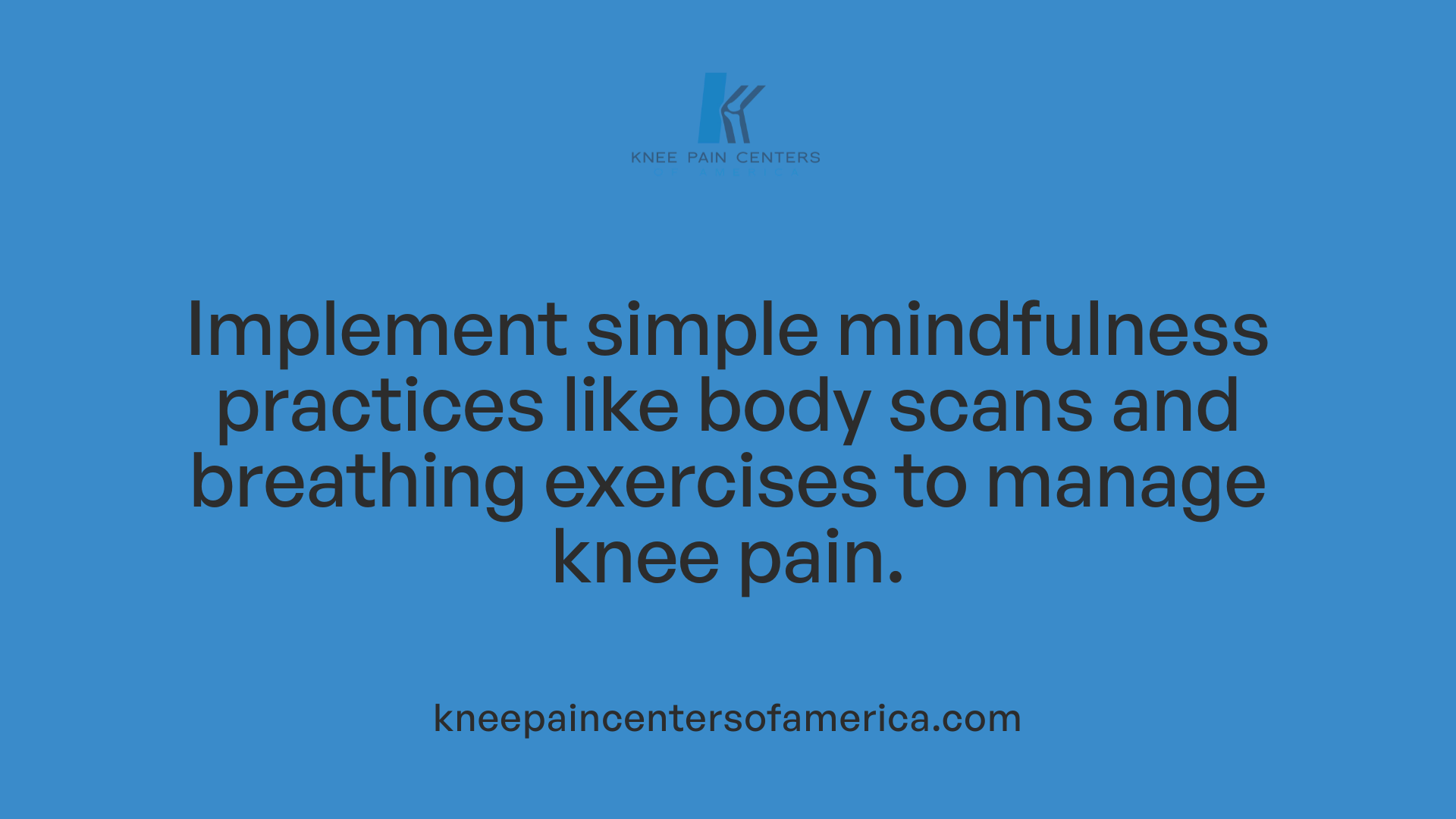Understanding the Potential of Mindfulness in Alleviating Chronic Knee Pain
Chronic knee pain, often stemming from osteoarthritis, affects millions worldwide, diminishing quality of life and complicating treatment. While conventional methods such as medication and surgery provide relief, emerging evidence suggests that mindfulness and stress reduction techniques can serve as powerful adjuncts. These practices offer a non-invasive, accessible way to manage pain, improve psychological health, and foster resilience amidst ongoing discomfort.
The Scientific Evidence Supporting Mindfulness-Based Interventions for Knee Pain

What scientific evidence supports mindfulness-based interventions for knee pain?
Numerous research studies and meta-analyses have investigated how mindfulness practices can influence knee pain, especially in individuals with osteoarthritis. These investigations generally show promising results, indicating that mindfulness-based interventions can significantly ease pain, improve physical function, and enhance overall quality of life.
One of the most informative clinical trials compared mindfulness techniques such as Mindfulness-Based Stress Reduction (MBSR) to usual care in adults suffering from symptomatic knee or hip osteoarthritis. This study enrolled 40 patients and involved weekly 2.5-hour MBSR sessions over eight weeks. The primary focus was on changes in WOMAC pain scores, alongside secondary measures like pain Visual Analog Scale (VAS), WOMAC subscales, and quality of life metrics. While the WOMAC pain score did not show a significant difference between groups at three or six months, the MBSR group experienced a meaningful decrease in pain intensity on the VAS at six months (-29.6 vs. -9.3, p=0.03). This indicates a delayed but sustained reduction in pain perception attributable to mindfulness practices.
Further supporting these findings, other studies document that mindfulness can help regulate emotional responses related to chronic pain, diminish pain catastrophizing, and foster better coping strategies. For instance, a recent application of Mindfulness-Based Cognitive Therapy (MBCT) in post-operative knee pain patients showed lower pain severity and interference six weeks after surgery, mediated through decreased catastrophic thoughts about pain.
Meta-analyses of multiple trials reinforce that mindfulness interventions not only target pain itself but also improve related psychological factors such as anxiety, depression, and stress. Overall, current evidence suggests that while mindfulness does not markedly reduce physical limitations directly, it may offer long-term emotional and perceptual benefits that support better pain management.
Long-term benefits and limitations of current evidence
Although studies highlight potential long-term advantages, including reduced pain intensity and better emotional resilience, there are limitations. Many trials involve small sample sizes, and the variations in intervention duration and participants' characteristics make it challenging to generalize findings. Moreover, measures such as WOMAC scores often show no significant differences immediately post-treatment, implying that benefits may develop gradually.
Future larger-scale, high-quality studies are needed to confirm these preliminary findings, better understand the mechanisms involved, and establish standardized protocols for integrating mindfulness into osteoarthritis treatment plans.
| Study Type | Population | Main Outcomes | Time Frame | Noteworthy Findings |
|---|---|---|---|---|
| Randomized Controlled Trial | 40 adults with OA | WOMAC pain, VAS, SF-36 | 3-6 months | VAS pain reduction, delayed onset of benefits |
| Post-surgery MBCT Study | 22 post-arthroplasty | Pain severity and interference | 6 weeks | Reduced pain catastrophizing, early pain relief |
| Meta-Analyses | Multiple trials | Pain, psychological health | Varies | Significant improvements in pain perception and emotional well-being |
Research continues to evolve. While current evidence supports the potential of mindfulness-based therapies as a supplementary tool in knee pain management, their role alongside traditional therapies warrants further exploration.
How Mindfulness Enhances Psychological Well-Being and Emotional Resilience in Knee Osteoarthritis

Impact of mindfulness on anxiety and depression scores in OA patients
Research indicates that mindfulness-based practices can significantly influence mental health outcomes in osteoarthritis (OA) patients. Higher mindfulness scores are linked to lower levels of anxiety and depression, helping patients manage the emotional toll of chronic pain.
Studies show that mindfulness reduces emotional distress by encouraging a non-judgmental acceptance of pain and discomfort. This acceptance diminishes the tendency to ruminate or catastrophize, which are common in chronic pain conditions. As a result, patients experience less worry and anxiety related to their condition.
Mindfulness interventions, such as mindfulness-based stress reduction (MBSR), have been associated with improvements in mood and reductions in psychological distress. These benefits contribute to a better quality of life and improved ability to cope with daily challenges posed by OA.
Facets of mindfulness most associated with mental health benefits
Certain dimensions or facets of mindfulness are particularly linked to psychological health. These include:
- Describing: The ability to put experiences into words helps in understanding and processing emotions.
- Acting-with-Awareness: Being fully engaged in the present moment reduces automatic, habitual responses that may exacerbate stress.
- Non-judging: Accepting thoughts and feelings without criticism fosters emotional stability.
These facets collectively support mental well-being by fostering an attitude of openness and acceptance, which can minimize negative emotional reactions associated with chronic pain.
Role of mindfulness in reducing emotional distress and pain catastrophizing
Mindfulness plays a vital role in altering how patients perceive and respond to pain and emotional stimuli. It promotes a mindset of acceptance rather than resistance, which is crucial for managing chronic discomfort.
One of the mechanisms is through decreasing pain catastrophizing—the tendency to magnify or ruminate on pain aspects—which is a strong predictor of emotional distress. Mindfulness training targets this maladaptive thinking by encouraging present-moment awareness and a non-judgmental perspective.
Additionally, mindfulness helps modulate stress responses by reducing cortisol levels, which can decrease inflammation and pain perception. It also improves emotional regulation, making it easier for patients to handle stress and negative emotions related to their condition.
| Aspect | Effect | Supporting Evidence |
|---|---|---|
| Anxiety and depression | Lower scores with increased mindfulness | Improved mood, reduced psychological distress |
| Facets of mindfulness | Increased describing, acting-with-awareness, and non-judging | Better emotional regulation |
| Emotional distress & pain catastrophizing | Decreased through acceptance and present-moment focus | Lower pain perception, improved mental health |
Overall, mindfulness fosters a resilient psychological state in knee osteoarthritis patients by addressing the emotional and cognitive components of chronic pain, leading to enhanced emotional resilience and well-being.
Practical Mindfulness Techniques for Managing Knee Pain

What are some practical mindfulness techniques for managing knee pain?
Managing knee pain effectively can involve several mindfulness-based practices that are simple to incorporate into daily life. One well-known technique is the body scan meditation. This involves lying down in a comfortable position and systematically focusing attention on different parts of the body, from head to toe. During this process, individuals acknowledge sensations, including pain, without judgment or resistance. Practicing this daily for about 45 minutes can help increase awareness of bodily sensations, facilitate relaxation, and support emotional regulation.
Another powerful tool is breathing exercises. Deep diaphragmatic breathing, also called breath control, helps relax the nervous system by controlling the flow of breath. This practice reduces anxiety and stress, which can amplify pain perceptions. By focusing on slow, deliberate breaths, individuals can foster a sense of calm and reduce the emotional struggle often associated with chronic knee pain.
In addition to formal practices, integrating mindfulness into daily activities such as mindful walking, eating, or even conversations can enhance overall well-being. Activities like gentle walking or cycling with a focus on bodily sensations encourage attentive movement that supports knee health.
These techniques are accessible and cost-effective, requiring only a few minutes each day. They can serve as valuable adjuncts to medical treatment, helping individuals develop resilience and a more accepting attitude towards pain. Regular practice not only addresses physical discomfort but also improves emotional health, making it easier to cope with the challenges of chronic knee osteoarthritis.
The Role of Mindfulness in Pain Perception and Stress Management

What are the mechanisms by which mindfulness alleviates chronic knee pain and emotional distress?
Mindfulness alleviates chronic knee pain and emotional distress through several interconnected pathways. Primarily, it works by shifting attention away from negative thoughts and emotional reactions toward present-moment sensory experiences. This shift reduces pain catastrophizing and hypervigilance, common contributors to chronic pain perception.
Neuroscientific evidence shows that mindfulness increases activity in brain regions involved in emotional regulation, such as the perigenual anterior cingulate cortex. Simultaneously, it deactivates areas like the amygdala, which play significant roles in processing fear and anxiety, as well as intensifying pain perception. By fostering a non-judgmental awareness of pain and emotions, mindfulness reduces automatic reactions that often exacerbate suffering.
In addition to neural changes, mindfulness influences hormonal responses. Specifically, it helps lower cortisol levels by decreasing stress. Reduced cortisol overproduction leads to less systemic inflammation, which is often linked to chronic pain conditions like osteoarthritis. It also promotes better sleep quality and decreases anxiety, further contributing to pain relief.
The combined effects on brain activity and hormonal regulation lead to a decrease in both the perception of pain and the emotional distress associated with it. As a result, patients experience less suffering and an improved quality of life. Integrating mindfulness into pain management thus offers a multifaceted approach that addresses both physical sensations and emotional well-being.
Integrating Mindfulness for a Holistic Approach to Knee Pain Management
While conventional treatments remain vital, incorporating mindfulness and stress reduction techniques offers a promising, non-invasive complement for managing chronic knee pain. Evidence indicates these practices can improve psychological resilience, reduce pain perception, and enhance quality of life. From scientific research to practical exercises, mindfulness empowers individuals to take an active role in their pain management journey. As further studies continue to validate these benefits, clinicians and patients alike are encouraged to explore mindfulness as part of a comprehensive approach to knee health, with the potential to reduce reliance on medication and surgery and to foster a greater sense of control and well-being.
References
- Evaluation of mindfulness based stress reduction in symptomatic ...
- Mindfulness and Knee Pain – Related?
- Mindfulness is associated with psychological health and moderates ...
- Meditation: Benefits for People with Arthritis
- The Power of Mindfulness: Easing Arthritis Pain and Improving ...
- How Mindfulness Meditation Can Help with Comprehensive Pain ...
- 6 Meditation Tips to Reduce Your Stress & Chronic Pain
- Mindfulness meditation to control pain - Harvard Health





